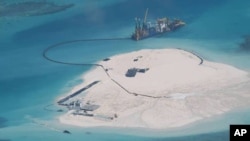The United States has continued to support the peaceful management and resolution of territorial and maritime disputes in the South China Sea. U.S. President Barack Obama reiterated this message during recent meetings in Southeast Asia, where he called for a halt to recent construction on disputed islands and submerged features in the South China Sea:
“We agree on the need for bold steps to lower tensions, including pledging to halt further reclamation, new construction, and militarization of disputed areas in the South China Sea,” he said.
China, Vietnam, the Philippines, Malaysia, Brunei and Taiwan all claim sovereignty over some or all of the land features in the South China Sea. However, since 2014, China has engaged in land reclamation on seven features in the Spratly islands, where the Philippines and several other countries also have claims.
The Philippines has recently brought elements of its dispute with China under the Law of the Sea Convention to an arbitral tribunal in The Hague.
While the U.S. does not take a position on the territorial claims of each nation, it insists that all claims be based on international law, and that differences be addressed peacefully through diplomatic and legal means.
“That’s why,” said President Obama, “the United States supports the Philippines’ decision to use arbitration under the U.N. Convention on the Law of the Sea to peacefully and lawfully address differences.”
The South China Sea is home to many valuable resources, including an important fishing industry. Vital shipping lanes traverse the area, carrying over half the world’s merchant shipping tonnage. The U.S. insists that behavior by all countries uphold the principles of freedom of navigation and overflight, unimpeded lawful commerce, respect for international law, and the peaceful resolution of disputes.






